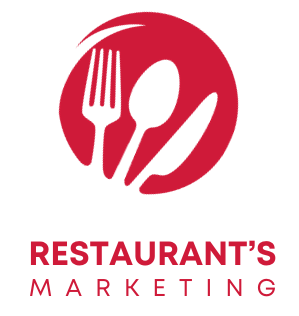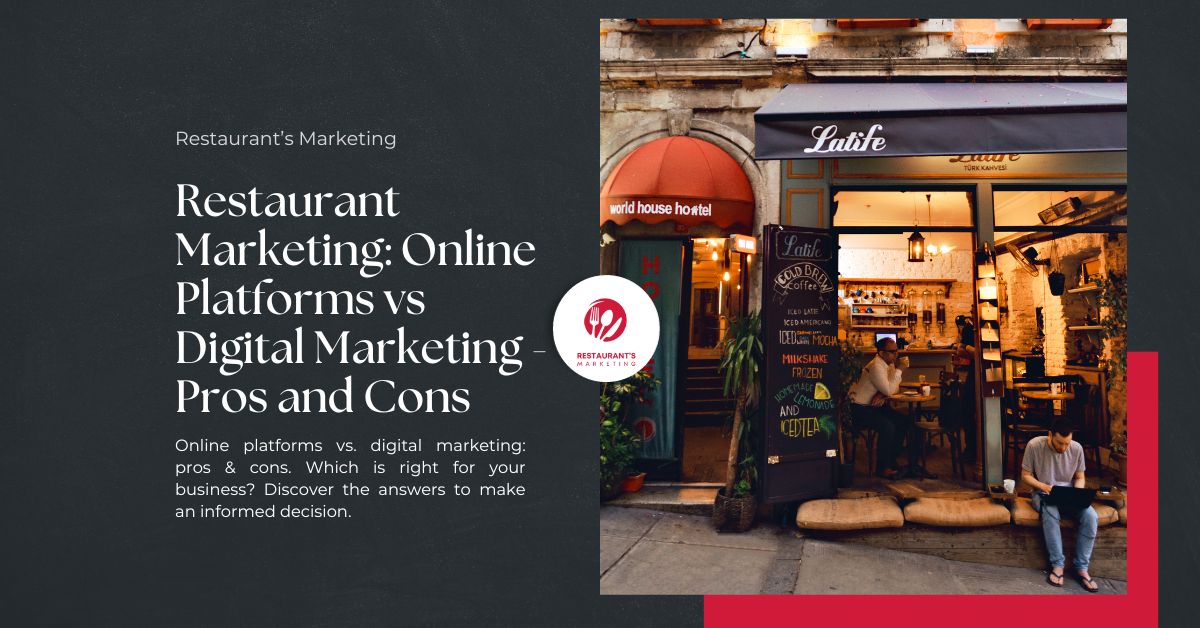Did you know that more than 70% of millennials order food from online food delivery platforms? That is a remarkable figure that highlights the evident impact of technology on the restaurant industry.
As a restaurant owner, you’re always looking for different ways to attract new customers while keeping your current ones coming back for more.
In today’s digital age, there are two main options: relying on online food delivery platforms like Uber Eats and DoorDash or investing in your digital marketing strategy. While both options have their advantages, there are some key distinctions to consider.
This blog is designed to help you navigate this decision by providing you with the facts and insights you need to make the best choice for your restaurant.
While digital marketing requires upfront planning and consistent effort, the long-term benefits outweigh the initial investment. Here’s a quick comparison:

Online Platforms
[UberEats, DoorDash]
Within the restaurant industry, online platforms function as digital bridges that link customers to a range of dining options. Users can browse menus, place orders, and take advantage of the convenience of food delivery provided by platforms such as Uber Eats, Swiggy, and DoorDash.
Pros:
- Increased Visibility: Your restaurant will be included among other restaurants in your area, making it easier for customers to find you.
- Convenience for Customers: Ordering food online is becoming increasingly popular, so being on these platforms can provide a convenient option for your customers.
- Order Management Tools: Many platforms include tools for managing orders, tracking deliveries, and communicating with customers.
Cons:
- High Commissions: Online platforms charge a commission on each order, which can cut into your revenues.
- Limited Control: You have limited control over how your restaurant is displayed on the platform, making it difficult to stand out from the competition.
- Short-Term Goal: When you stop making payments for your commission, your visibility on the site vanishes. This can make establishing long-term client loyalty challenging.
Digital Marketing
[Facebook, Instagram, Google]
Digital marketing for restaurants means using online tools like social media, websites, and ads to promote the restaurant. This includes having a good website, using social media for ads and engagement, optimising for online searches, managing reviews, sending emails, and analysing data. The goal is to increase sales by attracting more customers, both online and offline.
Pros:
- Targeted Reach: You can target your marketing to certain demographics and interests, ensuring that you reach the people most likely to become loyal clients.
- Branding: With digital marketing, you can build a powerful brand identity and share your story with a global audience.
- Long-Term Growth: Unlike online platforms, the benefits of digital marketing endure long after your spending ceases, establishing a sustained, long-term stream of leads.
- Cost-Effectiveness: While digital marketing has costs, it can be more cost-effective in the long term than paying commissions to online platforms.
Cons:
- Requires Time and Effort: Building a successful digital marketing strategy takes time and effort.
- Requires Specific Skills: You may need to hire someone with digital marketing expertise or learn the skills yourself.
- Trackable Results: It can be difficult to track the results of your digital marketing efforts and measure their impact on your business.
Frequently Asked Questions (FAQs)

Let's go over some frequently asked questions from restaurant owners about the pros and cons of online platforms and digital marketing.
While transitioning requires some initial effort, the long-term benefits often outweigh the short-term challenges. With the right guidance, the switch can be smooth, and the results are well worth the investment.
If you have the time and skills, you can certainly do your digital marketing. However, if you’re new to digital marketing or don’t have the time to dedicate to it, it may be best to hire an agency.
Utilise online platforms to drive traffic to your website, promote special offers and events, build your email list, and gather valuable customer feedback.
Conclusion
We hope this blog has equipped you with valuable insights into the pros and cons of online platforms and digital marketing.
In the end, the best approach for your restaurant will be determined by your demands and objectives. Consider your budget, resources, and target audience when making your decision.
Now it’s your turn to take action! Analyse your present marketing strategy to determine where to direct your efforts. If you’re not sure where to begin, consider hiring a marketing agency.
Experience success firsthand with transformative guidance.
You’ll get the same guidance and support that we give to our clients.
Charo Mel Peters is a content specialist who specialises in creating thought-provoking blogs about restaurant marketing. Her main objective is to provide thorough answers and strategic insights to the pressing problems that restaurant owners frequently face.
Contact
- charo(at)restaurantsmarketing(dot)com(dot)au


